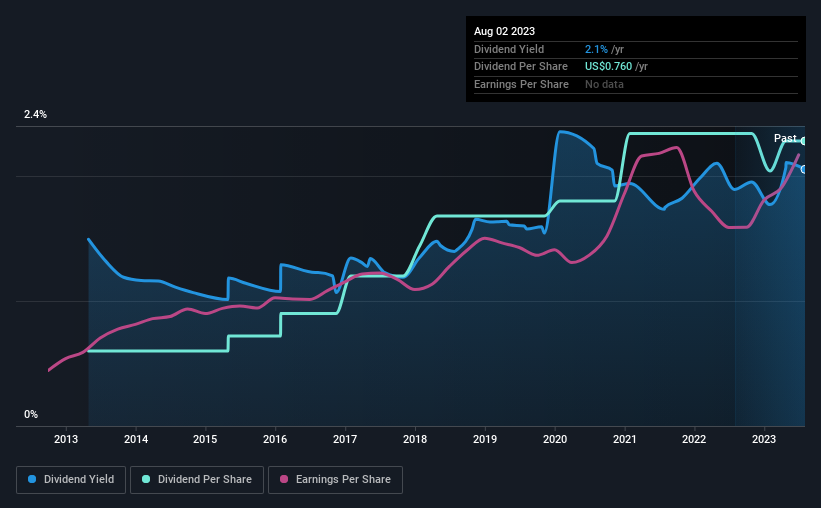There's A Lot To Like About Sound Financial Bancorp's (NASDAQ:SFBC) Upcoming US$0.19 Dividend
Some investors rely on dividends for growing their wealth, and if you're one of those dividend sleuths, you might be intrigued to know that Sound Financial Bancorp, Inc. (NASDAQ:SFBC) is about to go ex-dividend in just 4 days. The ex-dividend date is usually set to be one business day before the record date which is the cut-off date on which you must be present on the company's books as a shareholder in order to receive the dividend. The ex-dividend date is important as the process of settlement involves two full business days. So if you miss that date, you would not show up on the company's books on the record date. This means that investors who purchase Sound Financial Bancorp's shares on or after the 8th of August will not receive the dividend, which will be paid on the 23rd of August.
The company's next dividend payment will be US$0.19 per share. Last year, in total, the company distributed US$0.76 to shareholders. Calculating the last year's worth of payments shows that Sound Financial Bancorp has a trailing yield of 2.1% on the current share price of $37.01. Dividends are an important source of income to many shareholders, but the health of the business is crucial to maintaining those dividends. So we need to investigate whether Sound Financial Bancorp can afford its dividend, and if the dividend could grow.
Check out our latest analysis for Sound Financial Bancorp
Dividends are typically paid out of company income, so if a company pays out more than it earned, its dividend is usually at a higher risk of being cut. Sound Financial Bancorp has a low and conservative payout ratio of just 17% of its income after tax.
Companies that pay out less in dividends than they earn in profits generally have more sustainable dividends. The lower the payout ratio, the more wiggle room the business has before it could be forced to cut the dividend.
Click here to see how much of its profit Sound Financial Bancorp paid out over the last 12 months.
Have Earnings And Dividends Been Growing?
Stocks in companies that generate sustainable earnings growth often make the best dividend prospects, as it is easier to lift the dividend when earnings are rising. Investors love dividends, so if earnings fall and the dividend is reduced, expect a stock to be sold off heavily at the same time. For this reason, we're glad to see Sound Financial Bancorp's earnings per share have risen 15% per annum over the last five years.
The main way most investors will assess a company's dividend prospects is by checking the historical rate of dividend growth. In the past 10 years, Sound Financial Bancorp has increased its dividend at approximately 14% a year on average. Both per-share earnings and dividends have both been growing rapidly in recent times, which is great to see.
Final Takeaway
Is Sound Financial Bancorp an attractive dividend stock, or better left on the shelf? Companies like Sound Financial Bancorp that are growing rapidly and paying out a low fraction of earnings, are usually reinvesting heavily in their business. Perhaps even more importantly - this can sometimes signal management is focused on the long term future of the business. Sound Financial Bancorp ticks a lot of boxes for us from a dividend perspective, and we think these characteristics should mark the company as deserving of further attention.
On that note, you'll want to research what risks Sound Financial Bancorp is facing. For example, we've found 2 warning signs for Sound Financial Bancorp that we recommend you consider before investing in the business.
Generally, we wouldn't recommend just buying the first dividend stock you see. Here's a curated list of interesting stocks that are strong dividend payers.
Have feedback on this article? Concerned about the content? Get in touch with us directly. Alternatively, email editorial-team (at) simplywallst.com.
This article by Simply Wall St is general in nature. We provide commentary based on historical data and analyst forecasts only using an unbiased methodology and our articles are not intended to be financial advice. It does not constitute a recommendation to buy or sell any stock, and does not take account of your objectives, or your financial situation. We aim to bring you long-term focused analysis driven by fundamental data. Note that our analysis may not factor in the latest price-sensitive company announcements or qualitative material. Simply Wall St has no position in any stocks mentioned.

